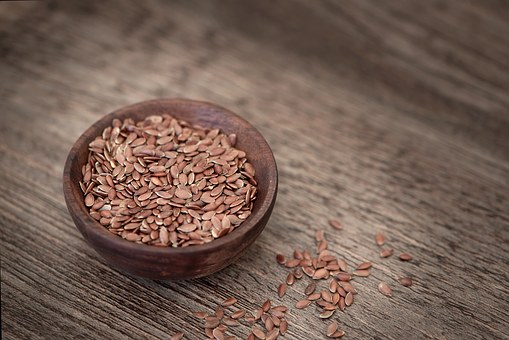
The Superfood Flax
Posted by SoundHealth on Tuesday, March, 17 2009 and filed under Nutrition
Key topics: Flax • Flax Seeds • Flaxseed Oil • Linseed • Cancer • Omega-3

Flax seeds and flaxseed oil are well-known for their many nutritional benefits and are frequently mentioned as a wonder-food. But what are they, and why are they so beneficial for us?
Flax is a plant grown mainly for its nutritional value and it is also known as 'linseed'. The plant contains small seeds which are full of oil and have a nutty flavor. Flaxseeds are available as a golden or brown variety, but the color of flax makes little difference to its taste and nutritional value.
Flax is a superb source of lignans, which are plant compounds that act like a weak form of estrogen. The body converts these into hormone-like substances that smooth out fluctuating hormone levels, which is why they are beneficial for women's health. These lignans have also been found to protect against some forms of cancer and are useful for healthy weight loss.
Flax seeds are a rich source of the omega-3 fat, alpha linolenic acid (ALA), which is a precursor to the form of omega-3 found in fish oils, which is eicosapentaenoic acid or EPA. These fats are found in their isolated form in flaxseed oil, which is a more concentrated source of ALA than the seeds themselves (although it doesn't have the other nutrients, such as lignans, that the seeds do). ALA, in addition to providing several beneficial effects of its own, can be converted in the body to EPA, thus providing EPA's beneficial effects. Although, higher amounts do need to be consumed to provide the same benefits as the omega-3 fats found in fish oil. Yet research indicates that flaxseed oil provides a good alternative for those who do not eat fish or don't want to take fish oil supplements.
These superseeds are also an excellent source of soluble and insoluble fiber, which is beneficial for regulating blood glucose, and for digestive problems, especially constipation.
Study Details
Some of the many studies into the health benefits of flax include:
Cancer: research has found that the fiber compound found in flax, lignans, slowed tumor growth in prostate and breast cancer patients.
Another study found that women with high levels of enterolactone (a weak phytoestrogen), linked to high lignan intake from foods like flax, have been shown to experience a fifty-eight percent reduction of breast cancer risk. An animal study found supplementation of flaxseed oil was effective in preventing colon tumor development, whereas corn oil, mostly omega-6 fats, promoted tumor growth.
Heart disease: flaxseed has been found to reduce inflammatory markers associated with increased risk for heart disease.
Diabetes: research showed that the addition of flax to the diet slowed the onset of type 2 diabetes in animals, and protected kidneys from the damage caused by diabetes.
Tips for Using Flax
- It is advisable to purchase flax seeds whole and grind them fresh when required, as once ground, the nutritional value of flax seeds deteriorates quickly.
- Ground flax seeds are also more easily digestible and are more nutritionally beneficial than whole flax seeds or flaxseed oil.
- Flaxseed oil is especially perishable and should be purchased in opaque bottles and kept refrigerated.
- Do not cook with flaxseed oil as it burns easily.
- Flax can be sprinkled on cereal, salads, soups, casseroles, baked breads and other cooked food.
References
- Dwivedi C, Natarajan K, Matthew DP. Chemopreventive effects of dietary flaxseed oil on colon tumor development. Drug News Perspect. 2000;13 (2):99.
- Johnson PV. Flaxseed oil and cancer: alpha-linolenic acid and carcinogenesis, in Flaxseed in Human nutrition, eds. S.C. Cunnane and L.U. Thompson. AOCS Press, Champaign, IL. 1995. pp 207-218.
- Piller RA, Chang-Claude JB, Linseisen, Jakob AB. Plasma enterolactone and genistein and the risk of premenopausal breast cancer. European Journal of cancer Prevention. 2006 (Vol. 15, pp. 225-232).
- Prasad K. Secoisolariciresinol diglucoside from flaxseed delays the development of type 2 diabetes in Zucker rat. J Lab Clin Med. 2001 Jul; 138(l):32-39.
- Velasquez MT et al. Dietary flaxseed meal reduces proteinuria and ameliorates nephropathy in an animal model of type II diabetes mellitus. Kidney Int. 2003 Dec;64(6):2100-2107.
Health, fitness and longevity
Based upon the principles of health
in the Qur'an and Prophetic Traditions.
HealthyMuslim.Com
There are two bounties in which
most people lose out: good health
and free time. Al-Bukhari.